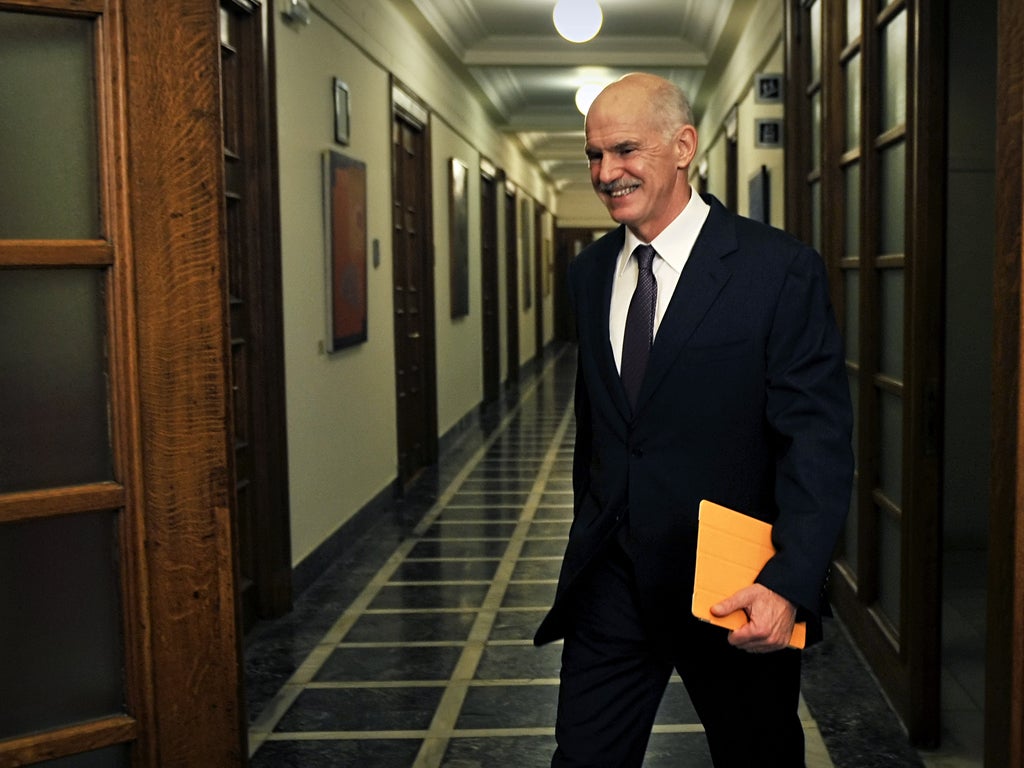Your support helps us to tell the story
This election is still a dead heat, according to most polls. In a fight with such wafer-thin margins, we need reporters on the ground talking to the people Trump and Harris are courting. Your support allows us to keep sending journalists to the story.
The Independent is trusted by 27 million Americans from across the entire political spectrum every month. Unlike many other quality news outlets, we choose not to lock you out of our reporting and analysis with paywalls. But quality journalism must still be paid for.
Help us keep bring these critical stories to light. Your support makes all the difference.
Greece's prime minister held firm early today to his shock decision to call for a referendum on a hard-fought European debt deal, despite anger from abroad, market turmoil across the world and dissent from within his own party.
George Papandreou's government still faced a battle for survival, with a vote of confidence scheduled for Friday and a grilling from frustrated European leaders expected later in the day ahead of the Group of 20 summit in the French Riviera.
After a gruelling seven-hour Cabinet meeting that finished after 3am local time, government spokesman Ilias Mossialos said Mr Papandreou's ministers expressed "total support for the initiatives taken by the prime minister". He said the referendum would be held "as soon as possible".
However, government officials said two ministers still had strong reservations with the idea of a referendum, which will be the first in Greece since the country voted to abolish the monarchy in 1974.
The officials spoke on condition of anonymity to reveal details of the Cabinet meeting.
Mr Papandreou told his ministers that putting the issue to the Greek people was the only way to safeguard the European deal.
"We will not implement any programme by force, but only with the consent of the Greek people," he said. "This is our democratic tradition and we demand that it is also respected abroad."
A referendum, he said, "will be a clear mandate, and a clear message within and outside of Greece, about our European course and our participation in the euro", he said, according to a text of his speech to the meeting issued by his office.
"The dilemma is not 'this government or another one', the dilemma is 'yes or no to the agreement', 'yes or no to Europe', 'yes or no to the euro,"' he said.
World markets were hammered after Mr Papandreou's surprise Monday night announcement amid fears the vote could unravel a deal which took European leaders months of complex negotiations among themselves and with banks to reach.
Greece's general price index plunged to close down 6.92%, while in Germany the Dax index, the major stock market average, lost 5% - the equivalent of about 600 points on the Dow. The French stock market closed down 5.4%, the Italian 6.7% and London 2.2%. The Dow Jones industrial average finished down nearly 300 points, or 2.5%.
European leaders made no secret of their displeasure.
"This announcement surprised all of Europe," said a clearly annoyed French president Nicolas Sarkozy, who has been scrambling to save face for Europe before he hosts leaders of the G20 major world economies beginning tomorrow.
"Giving the people a say is always legitimate, but the solidarity of all countries of the eurozone cannot work unless each one consents to the necessary efforts," he said.
Mr Sarkozy and German chancellor Angela Merkel, who have been at the forefront of Europe's efforts to contain the debt crisis, talked by phone and agreed to convene emergency talks today in Cannes, France, to which Mr Papandreou was also summoned to discuss implementation of the bailout.
The working dinner will also be attended by Jean-Claude Juncker, who chairs eurozone ministerial meetings, International Monetary Fund chief Christine Lagarde, top EU officials Herman Van Rompuy and Jose Manuel Barroso, and new European Central Bank chief Mario Draghi.
Mr Papandreou's decision could upend the October 27 deal that was the product of months of work by European leaders who were trying, sometimes opposed by their own people, to agree on the details of a second bailout for Greece and shore up their own economies in the name of saving the euro.
The deal would require banks holding Greek government bonds to accept 50% losses and provide Greece with about 140 billion US dollars in rescue loans from European nations and the IMF.
Greece has been relying since May 2010 on a first multibillion dollar bailout by other eurozone countries and the International Monetary Fund.
Mr Juncker said the referendum was a dangerous decision that could endanger Greece's next instalment of bailout loans - without which the country will run out of money in mid-November.
Dutch prime minister Mark Rutte, meanwhile, said he would try to prevent the referendum plan, saying he would "attempt to see that it doesn't happen". But he conceded it was up to Greece how it approves or rejects the European deal.
Mr Papandreou's decision had left his government teetering on the verge of collapse as his own deputies rebelled and his Socialist party saw its parliamentary majority whittled down to just two seats in the 300-member legislature with the defection of Milena Apostolaki. Others called for the prime minister's resignation and the creation of a national unity government.
"Yesterday's surprise and irrational announcement of the referendum has led me to doubt something that I considered certain until yesterday: That I am a member of a group that is striving to save our country from bankruptcy," Socialist deputy Hara Kefalidou said.
"I cannot back a referendum which is a subterfuge by a government that appears unwilling to govern."
AP
Subscribe to Independent Premium to bookmark this article
Want to bookmark your favourite articles and stories to read or reference later? Start your Independent Premium subscription today.

Join our commenting forum
Join thought-provoking conversations, follow other Independent readers and see their replies
Comments